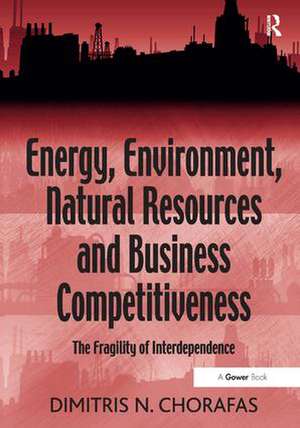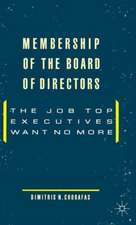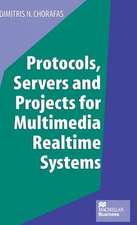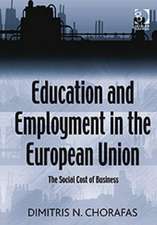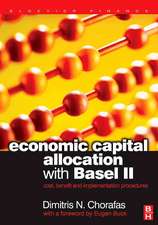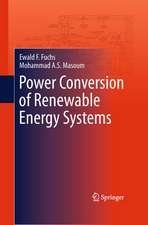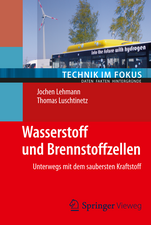Energy, Environment, Natural Resources and Business Competitiveness: The Fragility of Interdependence
Autor Dimitris N. Chorafasen Limba Engleză Hardback – 28 apr 2011
Preț: 771.71 lei
Preț vechi: 1031.80 lei
-25% Nou
Puncte Express: 1158
Preț estimativ în valută:
147.66€ • 154.17$ • 122.21£
147.66€ • 154.17$ • 122.21£
Carte tipărită la comandă
Livrare economică 05-19 aprilie
Preluare comenzi: 021 569.72.76
Specificații
ISBN-13: 9780566092343
ISBN-10: 0566092344
Pagini: 386
Dimensiuni: 174 x 246 x 32 mm
Greutate: 0.87 kg
Ediția:1
Editura: Taylor & Francis
Colecția Gower
Locul publicării:Oxford, United Kingdom
ISBN-10: 0566092344
Pagini: 386
Dimensiuni: 174 x 246 x 32 mm
Greutate: 0.87 kg
Ediția:1
Editura: Taylor & Francis
Colecția Gower
Locul publicării:Oxford, United Kingdom
Notă biografică
Professor Chorafas is an academic and consultant. He is a member of the New York Academy of Sciences and visiting faculty to the Ecole Polytechnique Federale de Lausanne (EPFL). He has been a Fulbright Scholar and has taught in 10 universities around the world. During his career, Dr Chorafas has been a consultant to the board of UBS, Bank Vontobel, Bank of Scotland, Commerzbank, Istituto Bancario Italiano, Credito Commerciale, Banca Provinciale Lombarda, First Austrian Bank, Italcementi, AEG-Telefunken, Osram, General Electric Bull, and a number of other companies. Over 8,000 executives around the world have attended his seminar programme. In 1992, in conjunction with the Swiss Academies of Sciences, he established his Foundation which grants annual awards to the best PhD graduates at 25 partner universities worldwide. Dr Chorafas has authored 153 books on engineering, mathematics, banking and finance. Many of them have got 5 stars out of 5 in rating. Among his most recent are 'Globalization's Limits' and 'The Business of Europe is Politics' and 'Education and Employment in the European Union' (February 2011) published by Gower.
Recenzii
Dimitris Chorafas once again demonstrates the profound breadth and depth of his intellect as he brings to bear his years of expertise as a technical innovator and business leader on the most pressing problems facing humanity today - energy production and environmental preservation in the face of overpopulation. This is a clarion call to action reviving the themes from the 1972 classic, Limits to Growth. Dr C. Dianne Martin,The George Washington University, USA
Cuprins
Preface; Part I The Pillars of a Realistic Energy Policy; Chapter 1 Energy Means Power; Chapter 2 The European Energy Policy Dilemma; Chapter 3 Managed Oil Markets; Chapter 4 Nuclear Energy; Chapter 5 Alternative Energy Supplies; Part II Biofuels, The Green and Blue Revolutions, and Agricultural Policy; Chapter 6 Biofuels and the European Union; Chapter 7 The Green and Blue Revolutions that Have Never Been; Chapter 8 The European Union’s Common Agricultural Policy and its Travails; Part III Business Consequences of A Deteriorating World Environment; Chapter 9 Strategic Inflection Points, Business Risks and Opportunities; Chapter 10 Producing and Trading Carbon Dioxide; Chapter 11 Forests and Oceans; Chapter 12 The Scarcity of Clean Water and its Impact; Part IV The World’s Salient Problem Has Not Been Solved; Chapter 13 Human Fertility; Chapter 14 United Nations and its Conferences on Environmental Collapse; Chapter 15 Can Science and Technology Solve Mankind’s Practical Environmental Problems?; Part V Appendices; appendixa The Best Way to Judge Progress towards Sustainable Fertility is by Agricultural Self-sufficiency; appendixb Independence in Energy Supplies is as Important as Independence in Food; appendixc Wastage has become Second Nature; appendixd Recycling is Wanting Because Progress in Materials Science is Lop-sided;
Descriere
Dimitris Chorafas reviews Europe, America and Asia’s energy needs in the coming decade, pointing out that current policies are inadequate at best, and more likely disastrous for the economy. Governments persist in having their own agenda and priorities as well as plenty of constraints and taboos, yet when he critically examines the challenges Dr Chorafas concludes that no government can solve all current energy problems by acting alone. The book confronts current thinking, and its after-effect on policies and practices. Readers accustomed to mainstream books and articles which blame fossil fuels for a deteriorating world environment will find this a contrary opinion.
